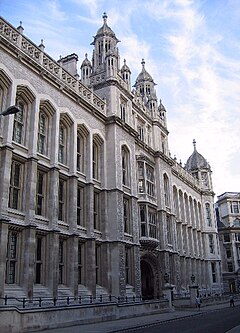Public Record Office
| Public Record Office | |
|---|---|

Entrance of the Public Record Office on Chancery Lane, now the Maughan Library, King's College London
|
|
| General information | |
| Type | National archive |
| Architectural style | Neo-Gothic |
| Town or city | City of London, London |
| Country | United Kingdom |
| Coordinates | 51°30′55″N 0°06′38″W / 51.5153°N 0.1106°WCoordinates: 51°30′55″N 0°06′38″W / 51.5153°N 0.1106°W |
| Design and construction | |
| Architect | Sir James Pennethorne |
The Public Record Office (abbreviated as PRO, pronounced as three letters and referred to as the PRO), Chancery Lane in the City of London, was the guardian of the national archives of the United Kingdom from 1838 until 2003, when it was merged with the Historical Manuscripts Commission to form The National Archives, based at Kew. It was under the control of the Master of the Rolls, a senior judge.
The Public Record Office was established in 1838, to reform the keeping of government and court records which were being held, sometimes in poor conditions, in a variety of places. Some of these were court or departmental archives (established for several centuries) which were well-run and had good or adequate catalogues; others were little more than store-rooms. Many of the professional staff of these individual archives simply continued their existing work in the new institution. Many documents were transferred from the Tower of London and the Chapter House of Westminster Abbey, though Domesday Book was not moved from Westminster Abbey until 1859, when proper storage had been prepared.
The PRO was placed under the control of the Master of the Rolls, a senior judge whose job originally had included responsibility for keeping the records of the Court of Chancery. Its original premises were the mediaeval Rolls Chapel (the former Domus Conversorum, a chapel for Jews who had converted to Christianity), on Chancery Lane at the western extremity of the City of London, near the border with the City of Westminster. The first Master of the Rolls to take on this responsibility was Lord Langdale (d.1851) although his Deputy Keeper, the historian Sir Francis Palgrave (who wrote a voluminous work on ancient writs, many of which were housed in the PRO), had full-time responsibility for running the Office.
...
Wikipedia
